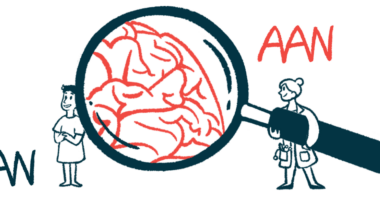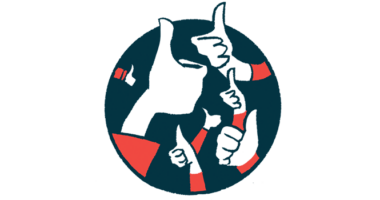Ultomiris now approved in Canada for AQP4-positive NMOSD adults
Approval of next-generation therapy follows similar decisions in EU, Japan

Ultomiris (ravulizumab) is now approved in Canada to treat adults with neuromyelitis optica spectrum disorder (NMOSD) who are positive for antibodies against aquaporin-4 (AQP4).
According to a press release from Alexion Canada, which will market Ultomiris in the country, it’s the “first and only” long-acting therapy of its kind for Canadian NMOSD patients.
“We are thrilled that Canadians living with NMOSD now have a new therapy option to help them manage this challenging disease,” said Gaby Bourbara, general manager of Alexion Canada. Alexion Pharmaceuticals, which is the original developer of Ultomiris, is now a subsidiary of AstraZeneca known as Alexion, AstraZeneca Rare Disease.
“We look forward to partnering with key stakeholders and payer partners across the country to ensure [Ultomiris] is reimbursed,” Bourbara said. “It is critical that progress is made on the implementation of Canada’s rare disease strategy and that patients have accelerated access to innovative therapies they need to live healthier lives.”
The approval of Ultomiris by Health Canada comes just a few months after similar decisions in the European Union and in Japan. In the U.S., regulators recently said that a program designed to reduce the risk of serious infections related to Ultomiris would need to be modified before the therapy is authorized for NMOSD.
NMOSD community in Canada welcomes Ultomiris approval
Ultomiris is designed to block the activation of the complement cascade, a group of immune proteins whose excessive activation helps to drive NMOSD. It works in a virtually identical manner to Soliris (eculizumab), an older approved NMOSD therapy also developed by Alexion.
However, the next-generation therapy is designed to last longer in the body, so it needs to be given less frequently. After a loading dose, Ultomiris is given by infusion into the bloodstream every eight weeks, whereas Soliris is given every other week.
“I am hopeful that the approval of this new therapy will improve the future outlook of those living with NMOSD in Canada,” said Galina Vorobeychik, MD, a clinical associate professor of neurology at the University of British Columbia.
“The huge benefits are that the amount of [Ultomiris] is determined by a patient’s weight and infused once every eight weeks which allows patients to travel and maintain their regular life between infusions,” Vorobeychik said.
Ultomiris’ approvals were supported by data from the Phase 3 CHAMPION-NMOSD clinical trial (NCT04201262), launched in 2019. That trial tested the therapy in 58 adults with NMOSD and antibodies against AQP4, the most common target of the self-reactive antibodies driving the rare autoimmune disease.
Results showed that none of the patients had a disease attack after a median of about 1.5 years on Ultomiris treatment.
Data from the study did not show any unexpected safety findings; common side effects included headache, pain in the back or joints, and urinary tract infections. Three patients experienced serious infections related to the immunosuppressive medication.
The huge benefits are that the amount of [Ultomiris] is determined by a patient’s weight and infused once every eight weeks which allows patients to travel and maintain their regular life between infusions.
Sumaira Ahmed, who lives with the disease and is the founder and executive director of the NMOSD-focused nonprofit The Sumaira Foundation, said the Canadian approval “represents a real innovation and improvement for our patient community, greatly simplifying work/life balance, travel plans, and the daily lived experience for NMOSD patients.”
“Patients can vary in their response to medicines, so having a wider range of therapy options to choose from is very important to patients and clinicians in successfully managing this rare but serious condition,” Ahmed said.
In the U.S. and other regions, Ultomiris is approved for other rare conditions related to complement overactivation, including generalized myasthenia gravis, paroxysmal nocturnal hemoglobinuria, and atypical hemolytic uremic syndrome.







